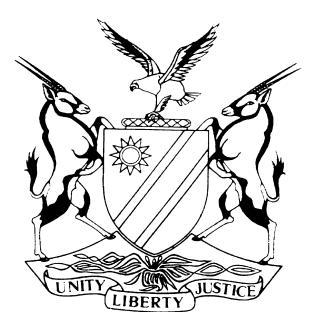R REPORTABLE

HIGH COURT OF NAMIBIA MAIN DIVISION, WINDHOEK
REASONS
Case no: CC 02/2004
In the matter between:
ELIAKIM NASHAPI APPELANT
and
THE STATE RESPONDENT
Neutral citation: Nashapi v S (CC 02/2004) [2013] NAHCMD 291 (17 October 2013)
Coram: CHEDA J
Heard: 23 September 2013
Delivered: 17 October 2013
Flynote: Application for condonation – Need to make a full disclosure about reasons for non-compliance – Courts will not syphathise with an untruthful applicant – Application dismissed.
Summary: Applicant gave contradictory statements about his non-compliance with rules in application for late noting appeal. Application for condonation was made 8 years after sentence, reasons were unsatisfactory - Application was dismissed as applicant was not candid with the court.

ORDER

The Applicant’s application for condonation of late filing of the appeal and leave to appeal is dismissed.

REASONS

CHEDA J [1] On the 23rd of September 2013 this application was heard by me. At the end of the hearing, I dismissed it with my reasons to follow. These are they.
[2] This is an application for condonation for the late filing of the appeal and leave to appeal. Applicant was convicted of murder and sentenced to 30 years imprisonment on the 8th of September 2004. On the 11th of April 2013, he noted an appeal against sentence and an application for condonation of late filing of the appeal.
[3] In terms of Rule 67 (i) of the Magistrate’s Court Rules, a convicted person is obliged to appeal his sentence under s 309 (1) of the Criminal Procedure Act of 1977 within 14 days of his sentence. Applicant lodged his appeal 8 years and five months after his conviction and sentence. There was therefore a need for him to apply for condonation for late noting of appeal.
Applicant is a layman and as such, appeared in person. In furtherance of his application, thereof, he filed an affidavit wherein he stated that he initially filed his application for leave to appeal on the 17th September 2004. He was not favoured with a response from the Registrar which prompted him to seek the intervention of the Ombudsman on 12 March 2006. The Ombudsman responded and advised him that the respondent’s office was not in receipt of his application.
[4] In his oral submission, applicant stated that he failed to lodge his application for leave to appeal against his sentence timeously because he was not aware of the requirements of an appeal. It is, however, noted at this stage that applicant was represented by Mr Sisa Namandje during his trial. When asked whether his legal practitioner did not advise him of his rights in relation to appeal, he was adamant that he did not.
[5] The process of appeal is an integral part of any democratic legal system. The courts, therefore treat it with the seriousness and importance it deserves as it is an individual’s right to do so. It is for that reason that any application by a litigant which is aimed at the attainment and enforcement of his right will not be easily dismissed by the courts. These courts have always entertained late filing of appeals provided that good cause is shown by the applicant. It is, therefore, incumbent upon applicant to make a full disclosure of the circumstances of his case in order for the court to make a decision from an informed position.
[6] Applicant bears the onus of giving a good explanation for his failure to appeal timeously. It is not necessary for the question of success on appeal to be considered. In order for applicant to succeed in his application he should give a convincing explanation to court if he is to avoid blame for non-compliance with the rules. This principle which is persuasive is now part of our law and was considered and adopted in S v Kashire1 (South West Africa Division) and S v Leon2 (as it then was). I am persuaded to adopt the reasoning in these cases.
[7] Applicant’s explanation for non-compliance is difficult to believe. In his founding affidavit filed with the court, he stated that he filed his notice in time, but, in court he stated that he was not aware of his legal rights or the requirements to file within a specific period, namely 14 days. There is a glaringly contradiction in his matter. Either, one of the statements or both are false. I do not think that he was truthful when he stated that Mr Namandje did not advise him of his legal rights regarding the appeal. Mr Namandje is a legal practitioner of great repute and an experienced one, too. He is meticulous in his work, this with due respect is an error he would not have made. The Latin maxim, falsus in uno, falsus in omnibus (false in one, false in everything) comfortably fits in this scenario.
[8] There is no way there can exist two different truths in any one given situation. Where a litigant, in its quest for justice seeks a sympathetic hearing, it is incumbent upon it to take the court into its confidence by making a full disclosure of its circumstances. The court can only determine an issue on the basis of facts genuinely laid before it by those who seek a redress of wrongs either real or imagined. When such truth is lacking the court so seized with the matter will no doubt be disabled in its fair and just adjudication.
[9] It is for those reasons that this application was dismissed as it lacked bona fides and was not meritorious.
--------------------------------
M Cheda
Judge
APPEARANCES
APPELLANT: In Person
Windhoek Central Prison
STATE: B Wantenaar
Of the Office of the Prosecutor General
Windhoek
1 S v Kashire 1978 (4) SA 166.
2 S v Leon 1996 (1) SACR 671 (A)